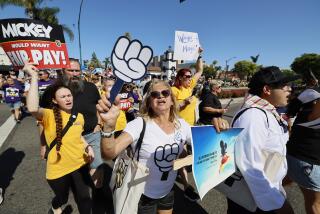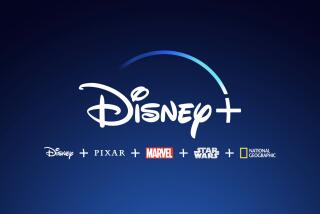Eisner Bids Employees to Take Ethics Seriously
The Walt Disney Co., which has made a fortune marketing morality in its films and entertainment, is refocusing on ethics within its own organization.
In a recent companywide letter that some believe is a reaction to the negative publicity that has rocked Disney this year, Chairman Michael D. Eisner exhorts employees never to lose sight of their “ethical compass” and to uphold “the reputation we have worked so hard to create.” He also reminds workers to call a company ethics hotline for guidance on appropriate conduct.
“While some may think that ‘winning at any cost’ is the name of the game, that is not the case at Disney,” Eisner wrote in the Nov. 8 letter, which went out to about 100,000 employees. “We must always choose the right way, not the wrong way or the short cut. And, when in doubt, we must head toward the light, never the dark.”
Some employees are puzzled that the executive best known for his edict of 20% annual earnings growth is now preaching a mantra of “truth, quality and ethical conduct.” The letter cites no examples of misbehavior at Disney, leaving some to ponder what prompted the missive--or to speculate on what’s coming.
“It’s like Texaco or something,” said one Disney worker, referring to the recent race discrimination scandal at the oil giant. “[Eisner’s letter] made me wonder if someone is about to be indicted.”
Company officials say the letter is simply a routine reminder of Disney’s exacting standards for corporate conduct, and not a reaction to any specific event inside or outside the company. Disney first distributed its ethics policy two years ago, and has offered the 24-hour ethics hotline “for some time,” according Disney spokesman John Dreyer.
“This is simply a periodic review of our ethics policy,” he said. “We are a growing company with a lot of new employees and we want to make sure everyone is aware of our high standards.”
*
Ethics scholars applaud Eisner for sending a clear signal from the top at a time when business ethics is fast becoming an oxymoron. “It’s better to seize the initiative than wait for a crisis,” said Jeffrey Sonnenfeld, an ethics expert at Emory University in Atlanta.
Still, some Disney watchers suspect a string of protests, boycotts, complaints and lawsuits have exacted a toll on the image-conscious company, motivating executives to take a fresh look at conduct within.
“Looks like all the sniping has gotten to them,” said Richard Foglesong, professor of politics at Rollins College in Winter Park, Fla., and a vocal critic of Disney’s hardball business tactics. “Eisner must suspect something is rotting in the corporation.”
Criticism comes with the territory for a company that’s become a stand-in for American culture and values worldwide. Still, this year has been particularly challenging for the entertainment giant on the public relations front.
The company has been hit with a number of boycotts by religious conservatives such as the Southern Baptists, who have lambasted Disney for its gay-tolerant employment policies and for its forays into films containing sex and violence.
Labor activists have accused Disney of exploiting Third World workers who sew its whimsical clothing lines. Even longtime fans have turned on the Mouse.
Disneyland lovers have burned up cyberspace in recent months with complaints about crass merchandising, lax maintenance and the triumph of corporate greed at the original Magic Kingdom in Anaheim.
Many fans felt manipulated when management extended the final run of the Main Street Electrical Parade until Monday, after promoting Oct. 15 as the final farewell in an ad blitz calculated to draw huge crowds to the park.
Disneyland also has been slapped with a number of lawsuits from patrons who allege they were roughed up by park security guards or strong-armed into paying fines before they were convicted of any crime.
*
Disney has denied wrongdoing and defended its actions in all cases. But observers say Eisner’s recent decree suggests the vaunted Disney culture may be unraveling just a bit as the company struggles to assimilate more outsiders into its far-flung entertainment empire.
“When you’re talking about a corporation that is all about values, you better make damn sure your own people understand what those values are,” said Jamie O’Boyle, a Philadelphia-based cultural historian who has studied Disney’s corporate culture. “This is an admission that there are some employees who don’t get it.”










